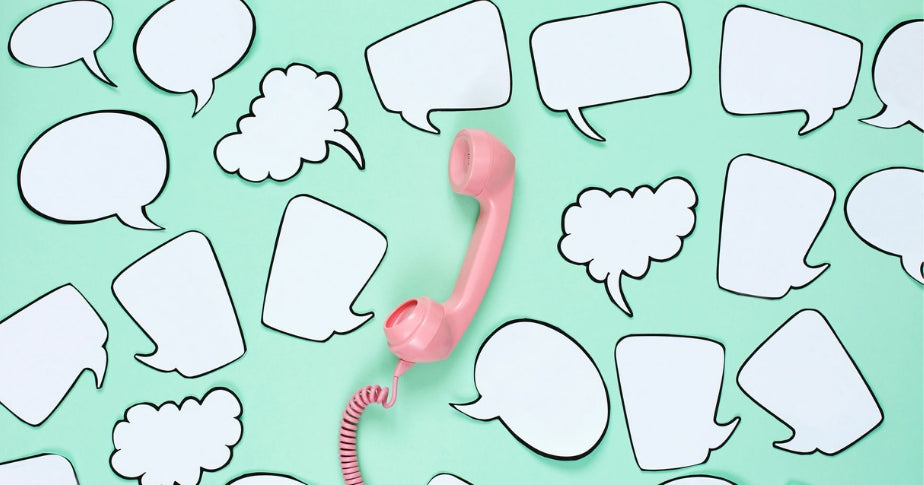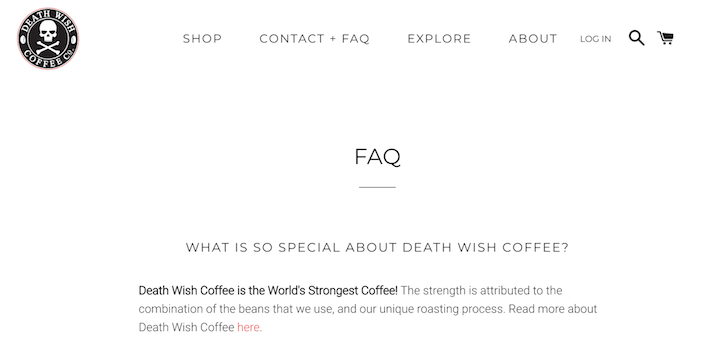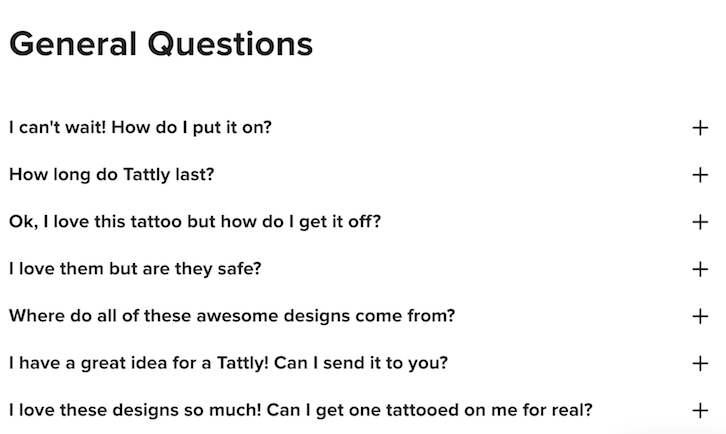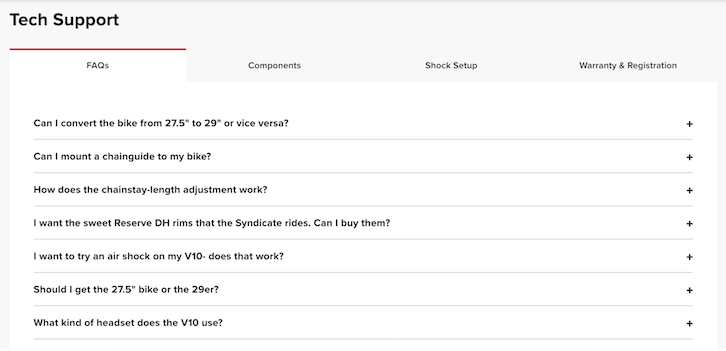The FAQ Page: Why You Need It, How to Build One, and 10 Great Examples

Your FAQ page isn’t just there to address common questions about your business. That’s only part of it.
An FAQ section done right can be an effective addition to your website that serves several functions, from:
- Alleviating purchasing anxieties that your product page copy doesn’t directly address.
- Relieving some of the burden on customer support by publicly answering common questions.
- Improving SEO and site navigation.
- Earning trust by demonstrating product expertise and explaining your business model.
- Delighting customers by creatively answering their questions.
- Proactively prevent customer complaints and negative reviews.
If you're not using your FAQ page to its full potential, here are some of the questions you should be asking to get the most out of this often-forgotten section of most websites.
Shopify Academy Course: How to Design Your Online Store
Creative director Stephan Peralta demonstrates how to design a brand people love and an online store even the most casual browsers want to buy from.
Enroll for free- What is a FAQ page?
- When is a FAQ page appropriate?
- Where do I look for “Frequently Asked” Questions?
- How should I answer my FAQs?
- Can a FAQ section help with SEO?
- Where should I put my FAQ section?
- FAQ page template
- How to add a FAQ page on Shopify: 5 apps to try
- Best FAQ page examples
- Answer questions to reduce customer frustration
What is a FAQ page?
In contrast to a landing page, where the goal is to convert buyers, the Frequently Asked Questions (FAQ) section is a part of your website where you address common concerns, questions, and objections that customers have.
It’s different from your About Us page where you tell the broader story behind your brand. The FAQ section, instead, deals with the details. It's the go-to destination for finding answers to specific questions about your product or business operation.
Your FAQ page can also act as the first point of contact for customers looking for answers before they reach out to you directly with their questions.
At Shopify, for example, we have a FAQ page that answers many questions that those initially considering website platforms can use to help them learn more about our tools.

When used right, your FAQ page can benefit customers at different parts of the purchasing journey—whether they’re in the consideration phase looking to understand how you source your product or an existing customer troubleshooting a problem.
In short, a FAQ page reduces the overall anxiety of purchasing online—and that goes a long way in getting on-the-fence customers to buy from you.
When is a FAQ page appropriate?
An FAQ page can be a distraction or an asset, depending on how you execute it.
But to ensure that it’s the latter, here are some indications that it’s time to incorporate a FAQ page as part of your website:
- Customers email you with the same questions on an ongoing basis, so it’s better to address them publicly and prominently.
- You have or plan to create content/landing pages that you can link to and continue the journey from question to conversion.
- Your product/service/business raises questions and concerns that are best handled in a straightforward manner.
That last point is especially important as a FAQ page presents a unique opportunity to directly address concerns and remove obstacles on the path to purchase.

Death Wish Coffee reiterates why customers should choose their brand at the top of their FAQ page, before diving into specific questions and answers.
Where do I look for “Frequently Asked” Questions?
Your inbox and customer support tickets will likely be the first places to look. But you should also anticipate objections that you can turn into questions, especially if the answer will put your customer’s mind at ease.
Consider how to strategically raise the right questions to educate customers about your products and create demand.
When deciding how to choose the questions you’ll include in your FAQ section, focus on relevancy, utility, and opportunities to turn that question into a path to further engagement or conversion.
If you end up with a long list of questions, group your questions under categories like “Shipping” or “About the Product” to make it easier for visitors to navigate. Pepper has each of their FAQ categories listed out so users can find the answers they need.

If you don’t have emails or customer support tickets to reference, check out competitors FAQs, product reviews for your items or items in your niche, and forums like reddit or Quora to see what types of questions people are asking.
Shopify Academy Course: How to Design Your Online Store
Creative director Stephan Peralta demonstrates how to design a brand people love and an online store even the most casual browsers want to buy from.
Enroll for freeHow should I answer my FAQs?
How you position your answers is key. Even if the question is about a potential shortcoming in your product or business, put on your PR hat and put a positive spin on your answer.
While you should demonstrate authority through the depth of your answers, be sure you’re not losing your audience by giving them more than they need.
Write your questions from your customer's perspective (e.g. "How do I...") and answer from your business's perspective (e.g. "You should..." or "We provide..."). Tattly does a great job of using their customer voice to phrase the questions, while still maintaining clarity.

Focus on clear communication first, and then the goal you’re trying to achieve with each question of your FAQ. Are you addressing a concern about purchasing from you? Educating your audience about a part of your business model? Troubleshooting a common problem with your product? Focus on delivering that in your answer and move on.
Use images or videos wherever they can supplement your answer. If it builds your brand, you can even sprinkle in a little personality to delight your customers with a couple of "fun" questions and answers.
An often-missed opportunity with many FAQ pages is ending your answer with a call to action that links to other pages to push visitors back into your funnel.
Consider what the next step would be for someone interested in a specific question and try to incorporate a link to the relevant page or piece of content that moves them forward on their journey as a customer.
Can a FAQ section help with SEO?
Many sites treat a FAQ section as a standalone page that uses a question and answer format to communicate information. While this serves the most basic function of a FAQ page—to reduce the friction on the path to purchase—you can also build a FAQ section with dedicated pages for each answer to create a more search-friendly section of your website.
By hyperlinking each question to a separate page, you can help surface each answer through Google and your own site’s search. Even if your audience isn't searching for topics related to your brand, they might be searching for answers to questions related to your industry via Google, which can help you get found if you create content or landing pages that are optimized for these specific search queries.
Here’s an example from MVMT Watches of a FAQ page that directs to a separate landing page for questions with more substantial answers, like their store locator page and their full return policy. There are also tabbed sections dedicated to domestic and international shipping, the same return policy, and how to contact the brand. With a FAQ section structured like this, some of the pages can also be found through Google as prospective customers search for this information.

Where should I put my FAQ section?
Drumroll: It depends. If customer service is a core part of your business, you might want to create a fully fleshed out support center or “help desk”, using HelpDesk or Zendesk, with a FAQ incorporated as part of your customer support flow (i.e. customers check the FAQ before they reach out to a customer service rep).
But if you’re selling products or services that are bound to generate a lot of questions, it might be enough to prominently display a link to a simple FAQ page in your website navigation to focus on reducing purchasing anxieties for visitors. WaterAid links to their FAQ page from the main menu, in their About section.

You can also integrate a FAQ directly into your product pages. You can make this part of your product descriptions or post it towards the bottom of the page, near customer reviews. Santa Cruz Bicycles does this with their products, using FAQs that are specific to the product featured.

If your main menu is already cluttered, you can put a link in your footer. This is where Speak Skincare highlights their FAQ page.

Shopify Academy Course: How to Design Your Online Store
Creative director Stephan Peralta demonstrates how to design a brand people love and an online store even the most casual browsers want to buy from.
Enroll for freeFAQ page template
Just like an about us page template, there is no universal FAQ template to follow. But there are common questions for each industry. Here are some of the big ones ffor ecommerce:
- What is the return policy?
- What are the shipping options?
- What are the international taxes, duties, etc. that I have to pay?
- When will I receive my order?
- What do I do if I never received my order?
- What do I do if I received a defective order?
- How do I make changes to an order I’ve already placed?
- Where are you located?
- How is the product made? Where do the materials come from?
- How do I make sure I order the right size?
- How do I contact your company if my question isn’t answered here?
After you have the basics down, dig deeper into your specific business. This is where those insights from email and customer support tickets come into play.
Safety and security
You’ll want to reassure customers that their information is kept private and secure. It’s also important to address any common questions about the safety of using the product itself. Bootea, for example, addresses concerns for its detox products when it comes to pregnancy.

Account management
Offer assistance for new and existing customers alike. Help them understand how to set up an account and access it at a later date. Also address basic account management tasks, such as password resetting and updating payment details.
Product features and brand promises
What’s your brand’s or product’s differentiator, and what questions do customers have about this? You want to use FAQs to reiterate your messaging. Many cosmetics brands, for example, use their FAQ pages to talk about cruelty-free products and the queries customers have around that.
Using the product
You want to use FAQs to not only persuade prospective customers but also to help customers who’ve made a purchase. Answer questions centered around getting started with the product, addressing any issues that customers might have when first using it.
How to add a FAQ page on Shopify: 5 apps to try
Shopify store owners can look to the App store for different ways to present their FAQ section.
1. FAQ by POWr
FAQ by POWr sets up your FAQ page with an accordion layout which users can click to expand or collapse. Customize your FAQ page with icons for questions, interactive hover effects, and colors of your choice.
FAQ pages built with this app are mobile-responsive and can include links, text, images, and videos. Provide search functionality so users can quickly get the answer they need, and leave most-asked questions open to gather more answers. Answer upvoting and downvoting adds another interactive element. Best of all? No coding required.
FAQ by POWr is free for up to 5 queries, and paid plans range from $4.49/month to $49.99/month.
2. HelpCenter
Also customizable, the HelpCenter app has several different layouts you can choose from, so you can find the style that matches your site’s look and feel. Create categories and implement search functionality to help users get to where they need to go.
HelpCenter also requires no coding and has a simple setup. Despite being free, reviewers of the app say customer service is responsive and helpful.
HelpCenter is free for all users.
3. FAQ ‑ Easy FAQ
FAQ – Easy FAQ also comes with the standard features: mobile-responsive, customizable “skins”, search functionality, and a collapsible accordion layout. It also has categorization, and you can include text, images, and videos.
Beyond that, this app allows users to submit new questions, which you can choose to publish or not. Make your FAQs even more visible and integrate them on other pages on your site.
FAQ – Easy FAQ has a free plan, or $4.99/month will get you more features like custom CSS and collections, while $9.99/month includes unlimited FAQs.
4. Enorm ‑ FAQ & Accordions
The next app, Enorm ‑ FAQ & Accordions, is another one with the common searchability, mobile-responsiveness, and customizability. The accordion-style pages can also be integrated elsewhere on your site, and installation is also easy for this one (no coding required!)
Enorm – FAQ & Accordions is $3.99/month for access to all features.
5. Re:amaze Live Chat & Helpdesk
Not exclusively for FAQs, but Re:amaze Live Chat & Helpdesk is one of the best all-around customer support apps. It centralizes customer support from live chat, chatbots, social media, email, SMS, and more, syncing up with customer profiles in Shopify so you can offer personalized support.
When it comes to your FAQ page, just one of Re:amaze’s many features, the content is a resource not only for shoppers but also for your support team — human or not. Chatbots will automatically reply to queries with the appropriate FAQ, and associates can use it as a reference library. Embed FAQs elsewhere on your site for a seamless experience across channels.
Re:amaze Live Chat & Helpdesk starts at $20/month, with $40 and $60 monthly plans also available.
Browse more FAQ Shopify apps here.
Best FAQ page examples
- Skinnydip London
- United By Blue
- National Portrait Gallery
- Colorado Crafted Box
- Roody Originals
- Comprehensive Cranium Care
- Shwood
- Factory 43
- Press
- The Colossal Shop
Skinnydip London

Women’s clothing and accessory brand Skinnydip London has a branded FAQ page on their site, categorized by payment, delivery, orders, refunds, product & stock, and account. Users can click to expand so the content isn’t overwhelming, and it’s easy for them to navigate the list of questions.
United By Blue

Sustainable goods retailer United By Blue also categorizes their FAQ page. The difference here is that the answers aren’t collapsible, so the categories compensate for that by making it easy to navigate. Answers are thorough and often include links so users can easily take the next step.
National Portrait Gallery

National Portrait Gallery’s FAQ page has a long list of questions, which are also categorized (notice a theme here?). Below each category, they summarize it with a single line of copy so users can understand if it’s the right section to find their answer. The visual representation is also different; questions are in clickable blocks which create an interesting aesthetic.
Colorado Crafted Box

Colorado Crafted Box keeps things a lot simpler than National Portrait Gallery. They keep the list of questions on the shorter side so as not to overwhelm users with too much information. They also have a bit of fun with it: “Hey, where’s all the chocolate?” one question presents. It’s a legit question, but written in a conversational and playful tone.
Roody Originals

Roody Originals has a unique product: custom ugly sweaters. As such, the brand has room to get creative with their brand voice, which you can see all over their site. They also incorporate this on their FAQ page, and keep questions very specifically related to their product and audience. You can tell they’ve carefully considered which questions to put here, being a unique product they have not-so-conventional Q&As.
Comprehensive Cranium Care

Comprehensive Cranium Care also uses a fun brand voice to sell their men’s hair care products, which are ironically made for men with no hair. The humor is alive and well on their FAQ page, but they also adequately address concerns and product promises.
Shwood

Sunglass and accessory brand Shwood has a really beautiful FAQ page. Stunning, on-brand visuals and well-designed graphics for each category elevate its aesthetic. Answers include links to take users where they need to go, which creates a positive and easy user experience.
Factory 43

Short and sweet is the best way to describe Project 43’s FAQ page. They’ve curated the most important and common questions in a succinct page. With such little space, it’s important to be true to your brand, which Project 43 does exceptionally well. For example, rather than listing “When can I expect to receive my refund?”, they opt for a more conversational “Where’s my refund?” which can help them relate to customers and reinforce their brand identity.
Press

Press has an aesthetically pleasing brand, and its FAQ page is no different. Clean design, simple color palette, and easy-to-read but on-brand font round out the look and feel. Answers to questions are brief but clear and complete, often including links for that seamless user experience.
The Colossal Shop

The Colossal Shop’s FAQ page is also full of helpful links. Brevity is the name of the game here; they get to the point and direct users to the next step. The short list of questions is easy to navigate, not intimidating users with a long list of queries. They also reiterate social proof on the right-hand side of the page to make customers feel confident in doing business with them.
Answer questions to reduce customer frustration
If you want to get the most out of your FAQ page, you need to make it discoverable where it matters most in the customer journey: when potential customers are considering a purchase and when existing customers are about to reach out to you.
You might see most FAQ pages buried at the bottom of a website’s footer, but they're better off incorporated into your site as part of your Support or Contact Us page, or navigation menu to ensure it gets found. It’s also important to update Your FAQ page over time as new customer concerns come up or as new opportunities arise to link to other pages in your questions and continue the customer journey.
The FAQ page is often an afterthought for many websites. But, used strategically, it can add a lot of value in different ways, from reducing the burden on customer support to alleviating purchasing anxieties. So, are you making the most of yours?
